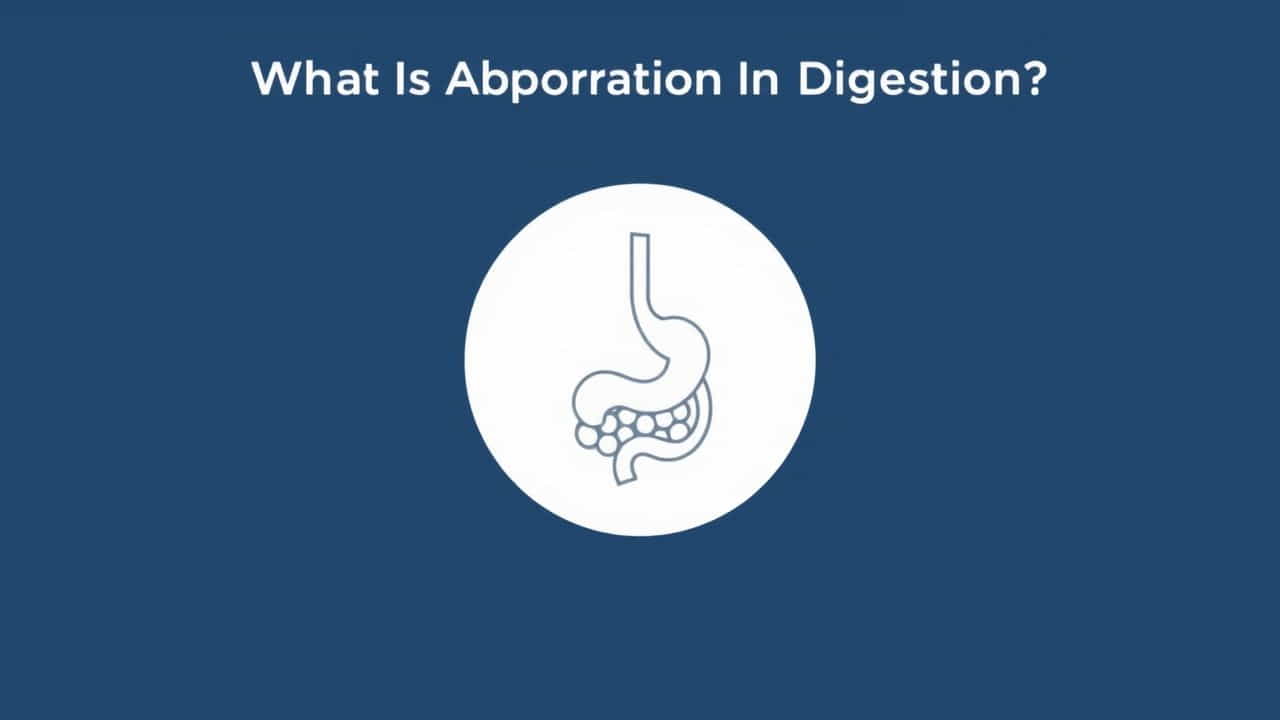Absorption is a crucial stage in digestion, allowing the body to take in essential nutrients from food. After food is broken down in the digestive system, the nutrients must be absorbed into the bloodstream and transported to cells for energy, growth, and repair.
Understanding how absorption works is essential for learning about human digestion, metabolism, and nutrition. This topic explains the process of absorption, the organs involved, and the importance of efficient nutrient uptake.
What Is Absorption in Digestion?
Absorption in digestion refers to the process of transporting nutrients from the digestive tract into the bloodstream or lymphatic system. Once absorbed, these nutrients are delivered to different parts of the body to be used for energy, growth, and cellular repair.
The majority of absorption occurs in the small intestine, but some nutrients are also absorbed in the stomach and large intestine.
Where Does Absorption Occur in the Digestive System?
1. Stomach
-
The stomach primarily breaks down food, but some absorption occurs.
-
Alcohol, water, and some medications like aspirin can be absorbed directly into the bloodstream through the stomach lining.
2. Small Intestine (Main Site of Absorption)
-
Most nutrient absorption happens here due to the presence of villi and microvilli, which increase the surface area.
-
Absorbs carbohydrates, proteins, fats, vitamins, and minerals.
3. Large Intestine (Colon)
-
Mainly absorbs water and electrolytes (sodium, potassium).
-
Helps compact waste before excretion.
How Are Nutrients Absorbed?
Different nutrients use various methods to cross the intestinal lining and enter the bloodstream. These include diffusion, active transport, and facilitated diffusion.
1. Passive Diffusion
-
Nutrients move from a high concentration (inside the intestine) to a low concentration (blood or cells).
-
Example: Small molecules like water and some minerals.
2. Facilitated Diffusion
-
Requires a protein carrier but does not need energy.
-
Example: Fructose (a type of sugar).
3. Active Transport
-
Requires energy (ATP) to move nutrients against a concentration gradient.
-
Example: Glucose and amino acids.
4. Endocytosis
-
The cell engulfs large molecules, allowing them to enter the body.
-
Example: Certain immune molecules in breast milk are absorbed by infants.
Absorption of Key Nutrients
1. Carbohydrate Absorption
-
Carbohydrates are broken down into monosaccharides (glucose, fructose, galactose).
-
Glucose and galactose are absorbed through active transport, while fructose is absorbed by facilitated diffusion.
-
Once in the bloodstream, glucose is transported to cells for energy.
2. Protein Absorption
-
Proteins are digested into amino acids and peptides.
-
Absorbed in the small intestine using active transport.
-
Amino acids are used for muscle growth, tissue repair, and enzyme production.
3. Fat Absorption
-
Fats are broken down into fatty acids and monoglycerides.
-
Unlike carbohydrates and proteins, fats enter the lymphatic system first before reaching the bloodstream.
-
Bile salts help emulsify fats, making absorption easier.
4. Vitamin and Mineral Absorption
-
Fat-soluble vitamins (A, D, E, K) are absorbed with dietary fats.
-
Water-soluble vitamins (C and B-complex) are absorbed directly into the blood.
-
Minerals like calcium and iron require special proteins for absorption.
5. Water Absorption
-
Around 80% of water is absorbed in the small intestine, while the remaining 20% is absorbed in the large intestine.
-
Proper water absorption prevents dehydration and helps maintain fluid balance.
Factors Affecting Absorption Efficiency
Several factors can enhance or reduce nutrient absorption in the digestive system.
1. Digestive Enzymes and Bile
-
Enzymes help break down food, making nutrients more accessible.
-
Bile is essential for fat digestion and absorption.
2. Gut Health
-
A healthy gut with balanced gut bacteria improves absorption.
-
Conditions like celiac disease or Crohn’s disease can reduce nutrient uptake.
3. Presence of Other Nutrients
-
Vitamin C enhances iron absorption, while calcium can interfere with iron uptake.
-
Fats improve the absorption of fat-soluble vitamins.
4. Food Processing and Preparation
-
Cooking methods impact nutrient availability.
-
Raw vegetables may retain more vitamins, while cooked foods can enhance absorption of some nutrients.
5. Medications and Health Conditions
-
Some medications interfere with nutrient absorption.
-
Conditions like lactose intolerance or pancreatic disorders can reduce digestive efficiency.
How to Improve Nutrient Absorption
Ensuring optimal absorption is crucial for maintaining good health and preventing deficiencies. Here are some tips:
1. Eat a Balanced Diet
-
Include whole foods rich in fiber, vitamins, and minerals.
-
Avoid processed foods that lack essential nutrients.
2. Chew Food Properly
-
Chewing breaks down food into smaller ptopics, aiding digestion.
-
Saliva contains enzymes that begin carbohydrate digestion.
3. Stay Hydrated
-
Water is essential for nutrient transport and digestion.
-
Drinking enough water prevents constipation and digestive issues.
4. Consume Probiotics and Prebiotics
-
Probiotics (yogurt, kefir, fermented foods) support healthy gut bacteria.
-
Prebiotics (fiber-rich foods like bananas and onions) feed beneficial bacteria.
5. Manage Stress
-
Stress can slow digestion and reduce nutrient absorption.
-
Mindful eating, exercise, and relaxation techniques help improve digestion.
6. Avoid Excessive Alcohol and Caffeine
- Alcohol and caffeine can damage the digestive lining, reducing absorption efficiency.
Why Is Absorption Important?
Efficient nutrient absorption is essential for:
-
Energy Production – Nutrients like glucose and fats provide fuel for the body.
-
Growth and Repair – Amino acids help build and repair tissues.
-
Immune Function – Vitamins and minerals strengthen the immune system.
-
Bone and Muscle Health – Proper absorption of calcium, vitamin D, and magnesium maintains strong bones and muscles.
Without proper absorption, the body can suffer from nutrient deficiencies, leading to fatigue, weakened immunity, and poor overall health.
Absorption in digestion is the process of taking in nutrients from food and delivering them to the body for energy, growth, and repair. It primarily occurs in the small intestine, where carbohydrates, proteins, fats, vitamins, and minerals are absorbed through various transport mechanisms.
Factors like gut health, hydration, and food combinations can enhance or hinder absorption. By maintaining a balanced diet and healthy lifestyle, you can maximize nutrient uptake and support overall well-being.
